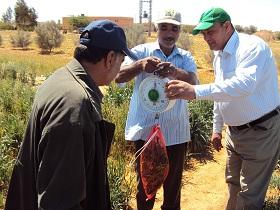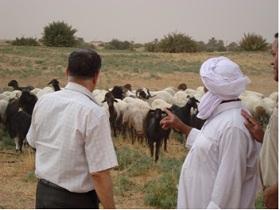Using AI to control energy for indoor agriculture
30 September 2024
Published online 17 November 2011

The conflict in Libya put a project involving the Agricultural Research Centre (ARC) in Tripoli and the Syrian-based International Center for Agricultural Research in the Dry Areas (ICARDA) in Aleppo, on hold for over nine months. This prolonged hiatus has threatened over two years worth of collected data.
The ARC is now in talks with ICARDA to restart the programme, just in time for the 2011 planting season, which usually ends in November. "We met with our Libyan partners who said they were eager to reactivate the programme," says Mahmoud Solh, director of ICARDA. "Our first line of action was to assess the damage that has resulted during the revolution."
The project, launched in 2008, planned to upgrade Libya's agricultural research capacity. With a US$31 million budget, allocated by the deposed Libyan government to provide equipment and logistics, the researchers built five research stations across the country, to cover the various climates.
"The reason behind the project was to promote the central role that boosting agricultural and livestock research can have on the development of Libya," says Fawzi El Doumi, who coordinates the ARC–-Libya ICARDA Collaborative Programme. "Our biggest priority in Libya was to develop our research capacity." "However, the most important thing for us now is that we do not lose the agricultural season. That is why we sent them new strains of seeds through neighboring Tunisia so we can plant in time this season," says Solh.
Through the programme, ICARDA sent the Libyan research stations new strains of bread wheat, durum wheat, barley, food legumes, lentils, chickpeas and forage. The Libyan researchers would then plant these varieties and monitor their yield and resistance to local diseases, salinity and draught in order to tailor them for Libya's needs and improve crop yields.
"We found parasites and worms and analyzed their genes to better understand how they affect our plants and livestock. Our local scientists worked with ICARDA, who have a long history in this kind of field work." explains El Doumi.
"Our second priority is the sustainable management of water resources in rain-fed farming and irrigated areas, as well as handling of ranches and rangelands," adds Solh. "Besides that, a large component of our programme was geared towards capacity building. We offered 18 masters degrees and 6 PhD degrees in biotechnology, water management, and livestock and rangeland management."
Most scientists in Libya are close to the age of retirement, so there is a great need to invest in younger talents.
Soon after the unrest started in the city of Benghazi in eastern Libya in February 2011, the programme struggled.
"All our activities stopped as the fighting spread. The funding we received from the government stopped coming through and that brought everything to a standstill," says Doumi.
ICARDA did not have any scientists in Libya at the outbreak of violence so there was no need to evacuate their staff. However, Libyan scientists working in the programme were increasingly under pressure as security deteriorated.
"Not all our research stations went on hold. Scientists in the Benghazi station, for example, were very brave and continued working, especially since things were quieter in the east because it was liberated first," says Mohammed El Mourid, ICARDA's North Africa regional coordinator. "In the west, scientists literally risked their lives daily when they continued working up to August — that was when it became impossible to stay in the stations."
Now, the ARC team is assessing the extent of damage inflicted on the research. "From first impressions, around 90–95% of the equipment is safe and sound. There is only one station in the eastern region which had some problems," says El Mourid. That particular station was used as a rebel base during their fight against Gaddafi loyalists.
"Once this assessment is complete we will see, together with our Libyan partners, how we can resume our research while staying pragmatic," adds El Mourid.
The seeds already sown last year, however, may not have remained unscathed. Estimates suggest that only a little more than half of the seeds were harvested and properly stored for research. "This means that we may have potentially lost a whole year's worth of data. This will make the results less accurate and useful," says El Doumi.

While both the Libyan researchers and ICARDA are keen to restart their operations, El Doumi says the future of the programme is contingent on the support of Libya's new interim government. "There are no promises from anyone yet that this agreement will continue. All we can do at ARC now is present a good portfolio on what we achieved and what we hope to achieve in the future," explains El Doumi.
"I have a feeling that if the new government is really representative of the people, then they will support the agreement," adds Solh.
Solh is also optimistic that ICARDA can help train a new generation of scientists to boost Libya's agricultural research capacity. "Most scientists in Libya are close to the age of retirement, so there is a great need to invest in younger talents."
"We are hoping this revolution will bring in a new generation of scientists and bridge this gap with the older generations to build Libya's future in the upcoming 5–10 years," adds El Mourid.
"I've been working with Libyans since 1995", says El Mourid, "and I had the pleasure to meet exceptionally well-educated scientists who helped us behind the scenes. If ICARDA succeeded in Libya in the past, it was because of the support of these scientists," he adds. "These people are who we will continue to count on in the future."
doi:10.1038/nmiddleeast.2011.156
Stay connected: